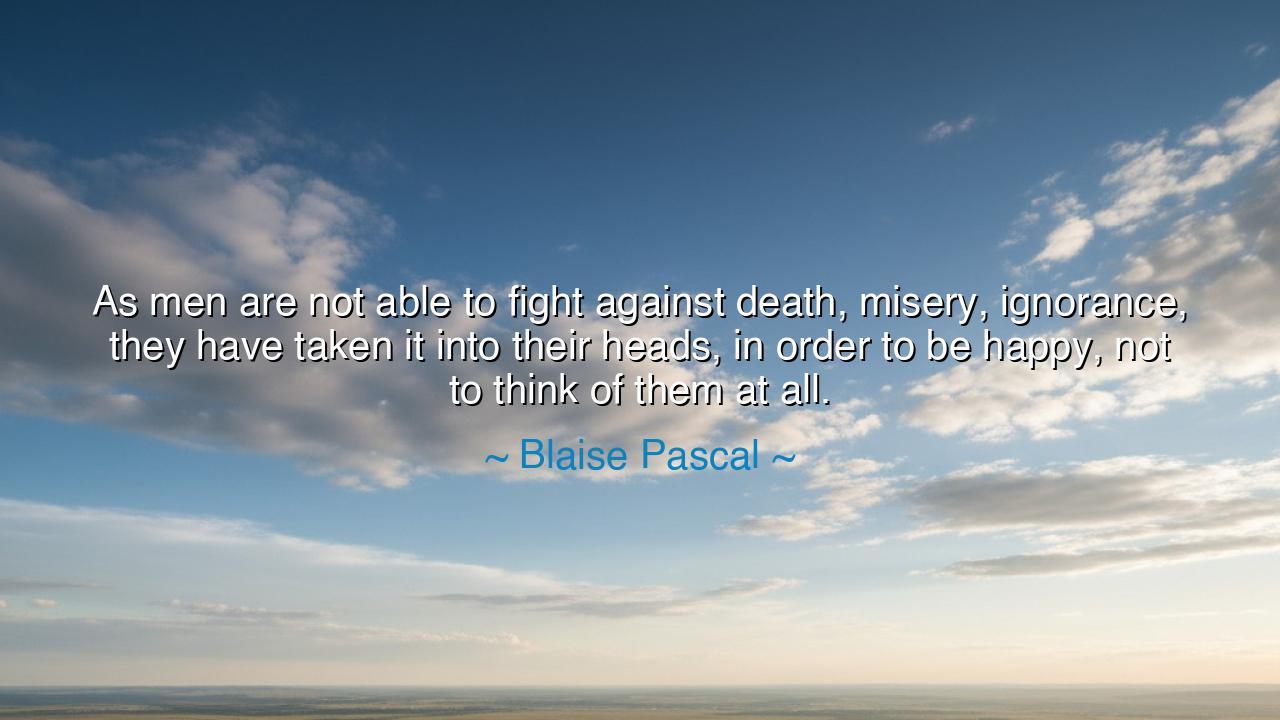
As men are not able to fight against death, misery, ignorance
As men are not able to fight against death, misery, ignorance, they have taken it into their heads, in order to be happy, not to think of them at all.






“As men are not able to fight against death, misery, ignorance, they have taken it into their heads, in order to be happy, not to think of them at all.” Thus spoke Blaise Pascal, the philosopher of faith and reason, who saw into the trembling heart of humanity with both intellect and sorrow. In this saying, he laid bare one of the oldest truths of the human condition — that mankind, powerless before the great forces of death, suffering, and ignorance, chooses not to conquer them, but to forget them. Rather than face the shadows that shape existence, men turn their eyes toward distraction, seeking false peace in forgetfulness. In these few words, Pascal revealed both our weakness and our tragedy: the avoidance of truth as the price of fleeting comfort.
In the age of Pascal, seventeenth-century France was a land of brilliance and decay — rich in intellect, yet haunted by mortality. As a mathematician and theologian, he saw the world through two lenses: the precision of science and the yearning of the soul. He knew that death was inevitable, misery inescapable, and ignorance unending — yet instead of despairing, he sought understanding. But he also observed the world around him: noblemen lost in vanity, common men numbed by habit, all of humanity rushing into distraction. He saw that people fled their own thoughts as if from wild beasts, fearing the silence in which truth might speak. Thus, he wrote this line in his Pensées, warning that the avoidance of suffering leads not to happiness, but to emptiness.
Since the dawn of time, humanity has waged war against the realities of existence. The ancient Stoics sought peace through reason, mastering their passions to face fate with calm. The Buddha sought release by confronting suffering itself, tracing its roots and overcoming it through enlightenment. Yet Pascal’s words reveal that most men take a lesser path: they run from the thought of their mortality. They fill their days with noise — work, pleasure, endless pursuit — all so they will not hear the whisper that says, “You are fragile, and your time is brief.” In their flight from sorrow, they flee wisdom itself, for the acceptance of mortality is the beginning of meaning.
Consider the story of Siddhartha Gautama, the prince who became the Buddha. Sheltered from pain all his youth, he lived surrounded by luxury, unaware of sickness, age, and death. But one day, he ventured beyond the palace and saw a dying man. In that moment, the illusion shattered — and he understood that suffering is the inescapable shadow of life. Where others might have turned away, he faced the truth and found enlightenment. His awakening is the opposite of what Pascal describes: for instead of hiding from misery, he walked through it. Thus, wisdom is born not of blindness, but of awareness.
Pascal’s warning resounds even louder in our own time. The modern man, with all his machines and wonders, is still the same as the men of old — terrified of silence, desperate to be distracted. The bright screens, the endless noise, the constant motion — all these serve the same ancient purpose: to keep us from thinking of what cannot be escaped. But what is lost when we live in such denial? We lose depth, gratitude, and humility — the very qualities that make life sacred. To refuse to think of death is to refuse to value life; to avoid suffering is to avoid compassion; to ignore ignorance is to forsake wisdom.
And yet, Pascal’s words are not only an accusation — they are an invitation. He calls us not to despair, but to remember. To look upon death not with fear, but with reverence; to face misery with mercy; to admit our ignorance so that we may learn. When we dare to think of these things, we become truly alive, for awareness gives birth to understanding, and understanding gives birth to love. The man who looks calmly upon life’s limits finds within them a strength unshaken by fate.
Lesson: Do not flee from the great truths that shadow your days. Sit with them. Think of death, not as an enemy, but as a teacher reminding you to cherish the hour. Acknowledge misery, and let it awaken compassion for all who suffer. Admit your ignorance, and let it open your heart to learning and wonder. The wise do not seek escape from these things; they seek meaning through them.
For as Blaise Pascal teaches, the path to peace is not in forgetting, but in remembering rightly. To live without thought is to live as a dreamer in delusion; to live with awareness is to live as one awake. Therefore, be unafraid to look into the mirror of mortality. For in seeing it clearly, you will not lose joy — you will find it, purified, eternal, and true.






AAdministratorAdministrator
Welcome, honored guests. Please leave a comment, we will respond soon